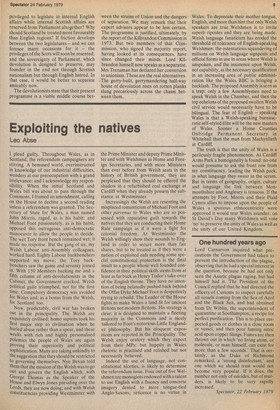Exploiting the natives
Leo Abse
I plead guilty. Throughout Wales, as in Scotland, the referendum campaigners are stirring. A bemused world, overinstructed in knowledge of our industrial difficulties, wonders at our preoccupation with a grand irrelevance: and I acknowledge my responsibility. When the initial Scotland and Wales bill was about to pass through the Commons, I framed an amendment, calling on the House to decline a second reading unless a referendum was granted. The Secretary of State for Wales, a man named John Morris, raged, as is his habit: and Michael Foot passionately, as is his habit, Opposed this outrageous anti-democratic manoeuvre to allow the people to decide. The wet Tory front bench remained wet; it made no response. But the gang of six, my Welsh Labour anti-Assembly colleagues, worked hard. Eighty Labour backbenchers supported my move; the Tory backbenchers saw the game and seventy joined in. With 150 Members backing me and a fifth column of anti-devolutionists in the Cabinet, the Government cracked. Welsh Political guile triumphed, not for the first time. Compulsory democracy was avoided for Wales and, as a bonus from the Welsh, for Scotland too.
Now, prddictably, civil war has broken out in the principality. The Welsh are exquisitely civilised: homo sapiens took his first major step to civilisation when he hurled abuse rather than a spear, and these weeks with rich and highly personalised Polemics the people of Wales are again Proving their superiority and political sophistication. Many are taking unkindly to the suggestion that they should be restricted to governing themselves. Nye Bevan told them that the mission of the Welsh was to go out and govern the English which, with George Thomas as the Speaker of the House and Elwyn Jones presiding over the Lords, they are now doing; and with Welsh Constituencies providing Westminster with the Prime Minister and deputy Prime Minister and with Welshmen as Home and Foreign Secretaries, and with more Ministers than ever before from Welsh seats in the history of British government, they are perplexed that they should be offered the shadow in a refurbished coal exchange at Cardiff when they already possess the substance at Westminster.
Increasingly the Welsh are resenting the misplaced romanticism of Michael Foot and other parvenus to Wales who are so possessed with reparative guilt towards the natives that they are conducting their Home Rule campaign as if it were a fight for colonial freedom. At Westminster the Welsh willingly show their wounds to England in order to secure more than fair shares, but to be treated as if they were a nation of exploited oafs needing some special constitutional protection is the final insult to a people whose well founded confidence in their political skills stems from at least as far back as Henry Tudor's take-over of the English throne. They have no intention of being belatedly pushed back behind the Offas Dyke Michael Foot is desperately trying to rebuild. The Leader of the House fights to make Wales a land fit for ancient Britons not modern Britons. His strategy is clear: it is designed to maintain a fleeting majority in the Commons and is nicely tailored to Foot's notorious Little Englander philosophy. But his eloquent expositions are rejected in the Principality. The Welsh enjoy oratory which they expect from their MPs: but happily in Wales rhetoric is practised and relished but not necessarily believed.
Indeed the use of language, not constitutional niceties, is likely to determine the referendum issue. Four out of five Welshmen are monoglots endowed with a talent to use English with a fluency and concrete imagery denied to mere tongue-tied Anglo-Saxons; reticence is no virtue in Wales. To deprecate their mother tongue, English, and more than hint that only Welsh speakers are true Welshmen is, to invite superb ripostes and they are being made. Welsh language fanaticism has eroded the threshold of tolerance of English-speaking Welshmen: the ostentatious squandering of millions on Welsh language signposts and official forms in use in areas where Welsh is unspoken, and the insistence upon Welsh, not capability, as the necessary qualification in an increasing area of public administration like the Wales BBC is bringing a backlash. The proposed Assembly is seen as a trap: only a few Assemblymen need to speak Welsh in the Chamber, and then the top echelons of the proposed swollen Welsh civil service would necessarily have to be bilingual. The fear of English — speaking Wales is that a Welsh-speaking bureaucratic self-styled elite will be the new masters of Wales. Sooner a Home Counties Oxbridge Permanent Secretary in Whitehall than the man from Machynlleth at Cardiff.
The truth is that the unity of Wales is a perilously fragile phenomenon. At Cardiff Arms Park a homogeneity is found: no-one would presume to ask the front row from my constituency, leading the Welsh pack, in what language they swear in the scrum. But in terms of geography, origin, culture and language the link between Monmouthshire and Anglesey is tenuous. If the attempts by Foot, Morris and their Plaid Cymru allies to impose upon the people of Wales a spurious ethnocentricity were approved it would tear Wales asunder: on St David's Day many Welshmen will vote 'no' to preserve the unity of Wales as well as the unity of our United Kingdom.


































 Previous page
Previous page